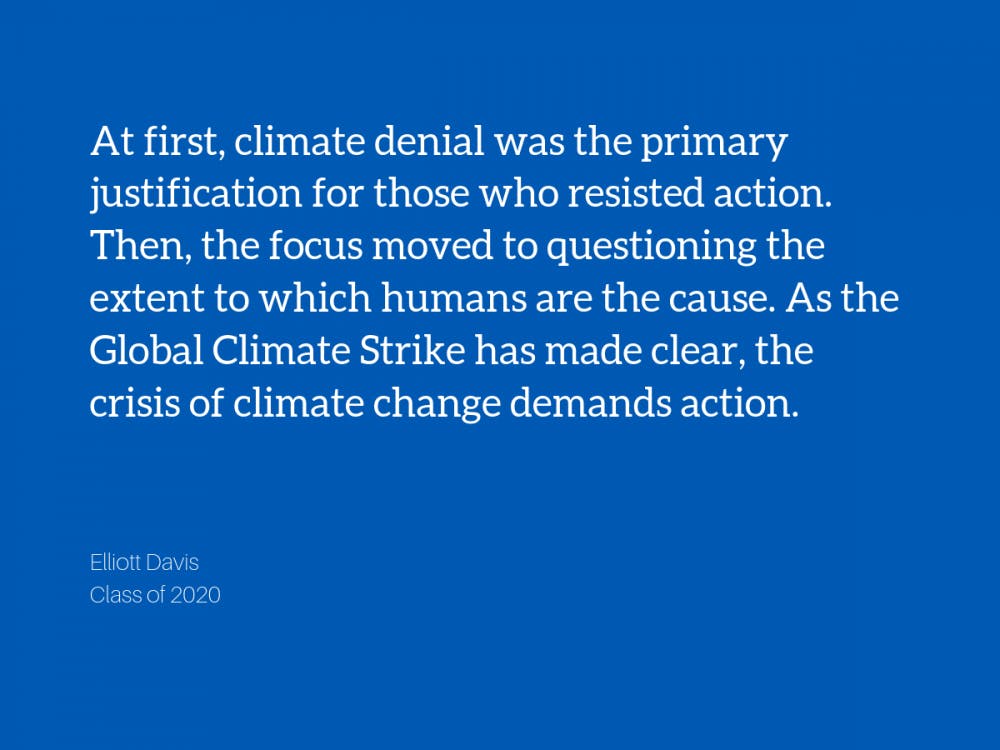This week, millions of people across the world are participating in the Global Climate Strike to call for the end of fossil fuels usage and to demand climate justice. Hundreds of people gathered for the Triangle Climate Strike in Raleigh on Friday and multiple Duke environmental organizations hosted a rally right here on campus. It’s inspiring to see how much momentum has grown for climate action.
In recent years, the conversation around climate change has progressed substantially. At first, climate denial was the primary justification for those who resisted action. Then, the focus moved to questioning the extent to which humans are the cause. As the Global Climate Strike has made clear, the crisis of climate change demands action.
Now, the question concerns what type of action we should take. Being fundamentally an optimist, as the title of my column would suggest, I believe that we have the capacity to transition away from fossil fuels, helping people and the planet, while also growing the economy. I also believe that climate change does not need to be a wedge issue in U.S. politics; rather it has the potential to build a bridge between Americans with varying backgrounds and ideologies.
This belief is what attracted me to Citizens’ Climate Lobby (CCL), a non-profit, nonpartisan grassroots advocacy organization focused on national policies to address climate change. CCL’s core values include optimism, relationships, being nonpartisan and diversity.
We are constantly hearing about the damage caused by climate change, the lack of substantive policies being implemented to address it and actions taken to undermine progress made. Not only is it disheartening, but it can create a sense of hopelessness. Even with events like the Global Climate Strike, it may feel like our voices aren’t being heard by the people who need to hear them most.
I chose to get involved with Citizens’ Climate Lobby because it offers a bipartisan, effective climate solution and has made significant strides in building the political will to achieve its goal. CCL’s priority is getting the Energy Innovation and Carbon Dividend Act passed in Congress and signed into law. This bill would reduce U.S. carbon emissions by 40% in 12 years and by over 90% by the year 2050, all while growing the economy, supporting American families, and promoting decarbonization efforts around the world.
Here’s how: the policy would put a fee on fossil fuels which would start low and grow over time, causing energy companies, industries, and consumers to move toward cleaner energy. This will generate a significant amount revenue, but rather than members of Congress fighting over how to spend it, the money will be returned to the American people as a “carbon dividend.”
The policy makes sense. When I asked Duke Economics professor Christopher Timmins about the proposal, he explained that “carbon taxes take a complex regulatory problem and simplify it dramatically by making people pay for the damage that their decisions inflict on the atmosphere. Companies that provide those goods and services will respond accordingly by changing their production techniques.” As a result of the efficiency and effectiveness, Carbon Fee and Dividend has been endorsed by over 100 municipal governments (including Durham County), newspaper editorial boards nationwide, and political leaders such as George Schultz who served in three Republican Presidential Administrations including as Secretary of State.
Since being introduced by a Democrat and Republican eight months ago, the bipartisan bill has garnered 62 co-sponsors in the House of Representatives, including North Carolina Representative David Price who represents part of Durham as well as Raleigh and Chapel Hill. There has been climate progress across Capitol Hill, with a Democrat and Republican Senator announcing the creation of a Senate Climate Solutions Caucus just last week.
However, there is still much work to be done. We need more people to lobby Congress, write letters to the editors, do tabling events, build partnerships, and spread the word. As the Duke lead for CCL’s Raleigh-Durham chapter, I am working to get more students and members of the campus community involved in this important mission.
I know it sounds cliche, but every person really counts. It could be your initiative that gets a Duke faculty member or local business to endorse this solution. It could be your letter that convinces our U.S. Representative G.K. Butterfield to cosponsor the bill. It could be your voice that inspires more members of Congress to sign on during a Lobby Day in Washington D.C.
The time for action is now. If you’re tired of inaction on climate change and want to be part of the Bipartisan Climate Solution, here is your opportunity. Fill out this form to get involved. Only through widespread and urgent action can we tackle this existential threat.
Elliott Davis is a Trinity senior. His column "The Optimist" typically runs on alternate Wednesdays.
Get The Chronicle straight to your inbox
Signup for our weekly newsletter. Cancel at any time.

